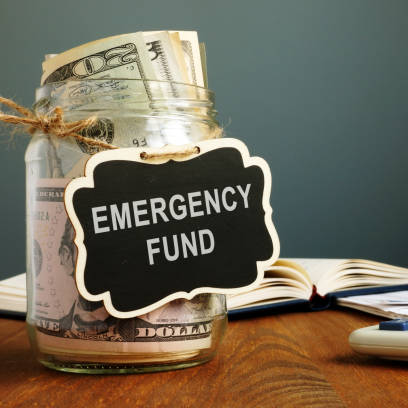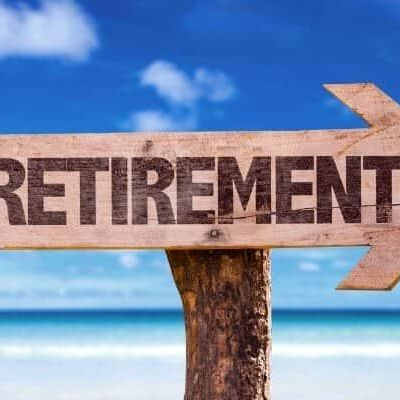Making and Maintaining an Emergency Fund in Retirement

Your annuity money will start coming once you retire, and even when the annuity begins, it won’t be as large as your income was. You might have to take money out of your savings to pay for extra living expenses.
One tactic is to accumulate a cash reserve before retiring. At least one year’s expenses should be set aside in reserve. For instance, if you anticipate spending $60,000 annually from your portfolio, you should try to set aside that amount in a money market fund or bank account.
You can set up automatic monthly payments to your checking account using a money market fund. This way, the lost income from your paychecks will be made up by cash from your cash reserve.
The next step is to find a replacement for the money withdrawn from your checking account. You might sell stocks or bonds to restock your cash reserve every six months. Required withdrawals from your IRA or retirement savings plans like the TSP must start once you turn 72, and that money can go into your emergency fund.
Making use of your taxed accounts initially is an additional tactic. This enables tax-deferred account growth going forward.
You typically incur income tax and a 10% penalty if you retire before age 59 1/2 and begin taking withdrawals from your retirement assets before that age. You will be passed the 10% penalty after 59 1/2. Then there may be circumstances in which it makes sense to withdraw funds from your IRA, such as when your future tax bracket will be higher due to changing tax rules or mandatory distributions from your IRA.
An emergency fund is important at any age, but retiring without one can be especially expensive. You won’t need to use your IRA, 401(k), or other taxable assets to cover unforeseen costs if you have an emergency fund. It may also guarantee that you won’t need to look for employment.
Calculating a sufficient amount for your emergency fund is essential for retirees who want to keep within their means. Determine the appropriate account type to hold the funds as well.
Frequently asked questions about emergency funds in retirement
What Justifies a Retiree’s Need for an Emergency Fund?
You shouldn’t have to liquidate assets or incur debt to pay for unforeseen expenses because emergency savings are designed to be used for just that. During your working years, an emergency fund can serve as a source of supplemental funds. This may be useful if you lose your job or are unable to work due to a serious illness or short-term disability.
As you approach retirement, there are extra benefits to having an emergency fund.
Long-term investment protection
When you withdraw money from your investment accounts, you could incur a loss if the market is down. You might use emergency savings funds first to give your portfolio some breathing room.
Assistance in paying medical bills
When it comes to paying for health care, emergency savings can fill the gaps. Think about a 65-year-old couple who retired in 2020 without access to retiree health benefits from their employment. Fidelity Investments estimates that this couple will spend $30,000 on medical expenses, not including long-term care. Medical bills could add up if insurance or Medicare doesn’t cover the entire cost of a major sickness or accident.
Help you cope with losing a part-time job
If you work part-time to augment your income or if your spouse is still employed, an emergency fund can provide a temporary source of income if one of those jobs is lost.
Covering home improvements related to aging or health
If you experience mobility problems, your home might need to be modified. You might need to widen doorways and corridors, create a ramp, or put grab bars in the restroom. You can prevent doing so by having an emergency fund rather than using your pension, 401(k), or IRA.
How much money should I have on hand, just in case?
Your emergency savings should be sufficient to pay for unforeseen costs, urgent situations, short-term savings targets, and regular obligations.
You have a lot of options for increasing your emergency savings before retirement. You may use tax refunds, bonuses from ongoing employment, or additional earnings from a part-time job. Depending on your circumstances and financial plan, you might use required minimum distributions (RMDs) to increase your emergency fund.
So certainly, even in retirement, it’s a good idea to have a “rainy day” fund. Your financial advisor can offer advice on developing an emergency fund and planning for unforeseen situations in life.
Contact Information:
Email: [email protected]
Phone: 7242723902
Popular posts

Checklist for a Successful...
Key Takeaways: Proper preparation...

FEGLI Coverage Options: Choosing...
Key Takeaways: Understanding the...
Free Retirement Benefits Analysis
Federal Retirement benefits are complex. Not having all of the right answers can cost you thousands of dollars a year in lost retirement income. Don’t risk going it alone. Request your complimentary benefit analysis today. Get more from your benefits.
I want more



